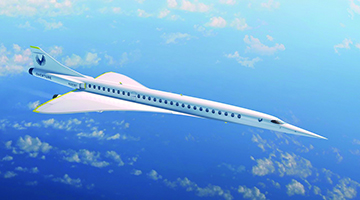“Space has the ability to produce a triple bottom line, or ROIII: Return on investment, innovation, and inspiration.” — Robert C. Jacobson
If you ask most Colorado residents to name the top attractions that define their state, you’ll hear things like professional sports, recreational and medical cannabis, and year-round outdoor recreation and adventure. Yet, most folks may be unaware that, according to the Colorado Office of Economic Development and Economic Trade (choosecolorado.com), the Centennial State holds the top ranking in private aerospace employment concentration and is host to the nation’s second largest aerospace economy.

High Speed Flight: Boom Supersonic aims to use ultra-high-speed flight to get travelers to their destinations in under half the normal time.
A July 29, 2021, article in The Denver Post announced the addition of yet another aerospace company to the local roster — PteroDynamics — a California-based company that will soon be headquartered in Colorado Springs. The piece quotes Governor Jared Polis as saying, “Colorado continues to be the leader in aerospace and defense industries, so this new announcement and the 186 good news jobs that come with it further strengthens our reputation as the nation’s best place for aerospace.” Additionally, according to a 2020 report by the Metro Denver Economic Development Corporation, Colorado is home to 290 aerospace tech companies employing a total of 33,460 employees with over 500 organizations specializing in aerospace products and services. Over the past five years, aerospace employment has grown over 30% in Colorado — placing the state 12% higher than the national average.
The industrial roll call is impressive and diverse. The list of companies runs the gamut in terms of size and configuration — comprising a variety of private sector startups, medium-sized companies, and large corporations with household name recognition. While this is far and away from a comprehensive list, here is a brief sampling of the sort of incredible innovation and forward-thinking commerce taking place in your own backyard.
Boom Supersonic
According to Founder and CEO Blake Scholl, the Denver-based company was built on a philosophy of “Speed, safety, and sustainability without compromise,” as explained in a company promotional video. “We’ve made incredible advancements in the foundational technology for designing, developing, and building aircraft,” Scholl continues. “We have advanced aerodynamics, new materials, and significantly more efficient engines.” The company boasts the XB-1, the industry’s first-ever independently developed supersonic jet. Which has served, through trial, error, and improvements upon both to inform every aspect of the company’s passenger airliner, Overture. Boom Supersonic designed this commercial jet to serve travelers with flight times twice as fast as current commercial airlines.
Atomos Space

Missile Launch Technology: Boecore specializes in early warning missile launch technology, among other things.
Dedicated to meeting and exceeding the satellite-launching needs of the telecommunications industry, this award-winning Denver-based company is currently under contract with NASA. Their philosophy is to end the launching of single-use rockets to launch satellites into space. In a company website video, Co-Founder and CEO Vanessa Clark equates the current practice to “flying passengers one at a time in a Boeing 747.” She explains, “At Atomos, we are building and operating space tugs — transportation vehicles that are the connecting flights for space. Rockets no longer need to go to the specific orbit for a specific satellite. With space tugs, rockets can launch all satellites to a single drop off point, and we’ll take them from there.” Essentially, Atomos is the world’s first satellite rideshare company. The benefits are threefold: decreased cost to get into space, increased number of satellites per launch, and reduced wait times for a scheduled launch.
Boecore
This Colorado Springs-based aerospace and defense engineering company is women-owned and operated and maintains a small business status with fewer than 200 employees and a personnel-centric company culture. Their website states that they specialize “in software solutions, systems engineering, cybersecurity, enterprise networks, and mission operations.” With a client base consisting mainly of government agencies, Boecore boasts a highly respected company reputation as well as an impressive array of industry awards, including the 2020 Pro Patria Award for Extraordinary Employer Support, Entrepreneur of the Year Award, and Best Workplaces in Colorado Springs — among many others. Company innovations include early warning missile launch technology, space operations software solutions, Battlespace Operational Readiness Game (BORG) training modules, and many others.
York Space
This Denver-based company operates a “mega-facility” for commercial manufacture of satellites for companies who want to operate satellites in orbit. A news blog released earlier this year on the company website announced the recent expansion of its headquarters into a 100,000 square-foot facility. Company CEO Dirk Wallinger recently told CNBC the expansion adds “a true robust production capability to help secure our supply chain and help us expand the contracts that we’re working on with existing customers.” He went on to explain that the upgrade will take the company’s current manufacturing of 1,000 spacecraft per year and, “blow that out of the water as far as total production capacity goes.” York’s business model leverages a proprietary design known as the S-CLASS platform. The design is based on a three-axis stabilized spacecraft intended for constellations and designed for mass production. Buyers can use the modules for a variety of missions such as weather monitoring, communication, and observation.
The list goes on and on — including recognizable monikers such as Lockheed Martin, EnerSys, Merrick & Company, Ball Aerospace and Technologies Corporation, Ascent Solar, and many more.
It Begs The Question
With all these engineering geniuses in proximity, it is utterly baffling that Colorado — specifically the Front Range and the Western Slope I-70 corridor — are facing widespread engineering mishaps and systematic infrastructure breakdown. You would think that the elected leaders, with immediate access to such innovation and solution-oriented implementation, would reach out and ask for a bit of advice from folks who truly know how to solve problems. It is possible, however, that most of these aerospace firms have blocked incoming calls from government phone numbers. Or perhaps they are all simply too smart to get involved with politicians and bureaucrats. Or maybe — just maybe — given Colorado’s elevation and relative proximity to the stratosphere, they are all working in unison to find the quickest way off this troubled planet, if only for a little while.

